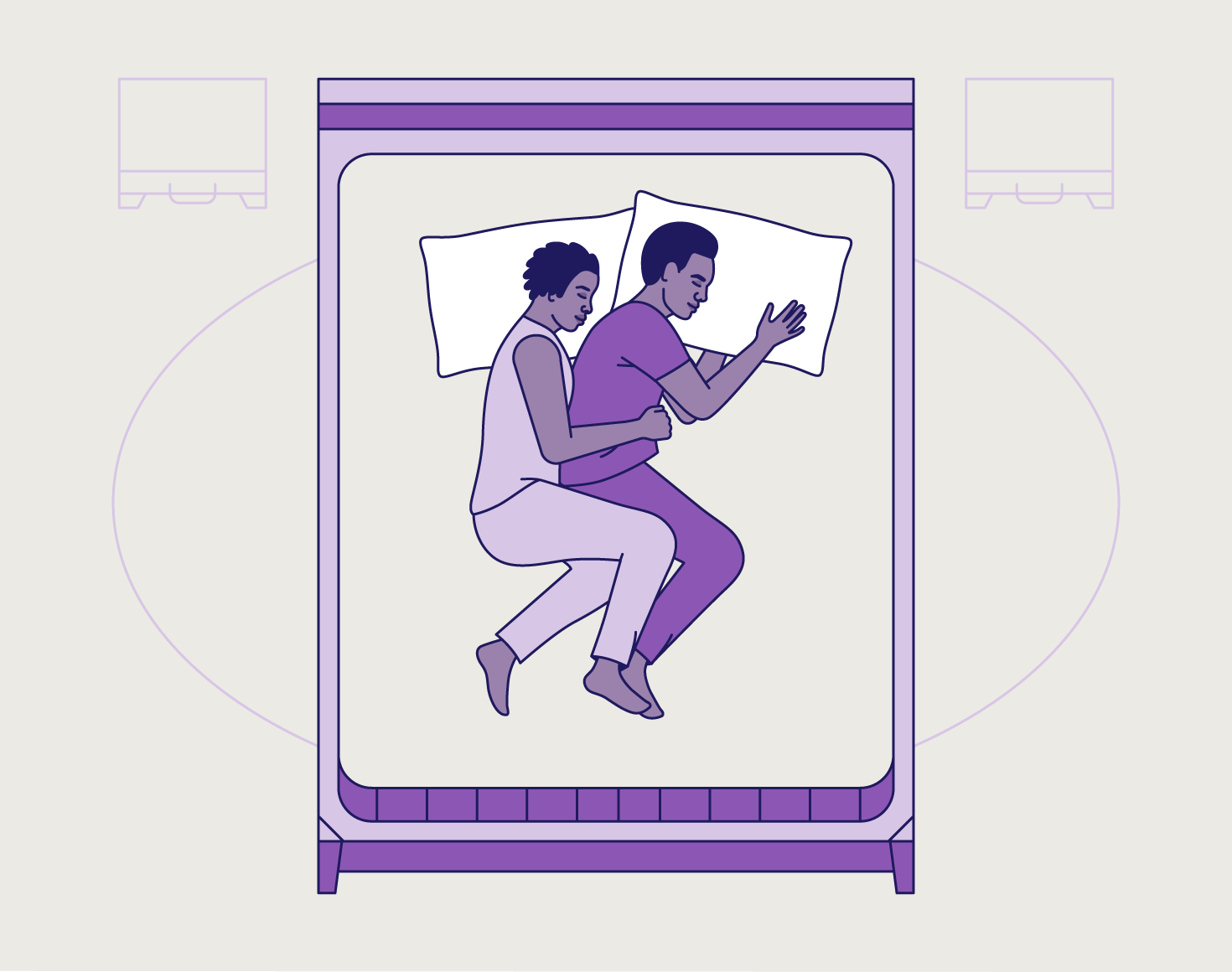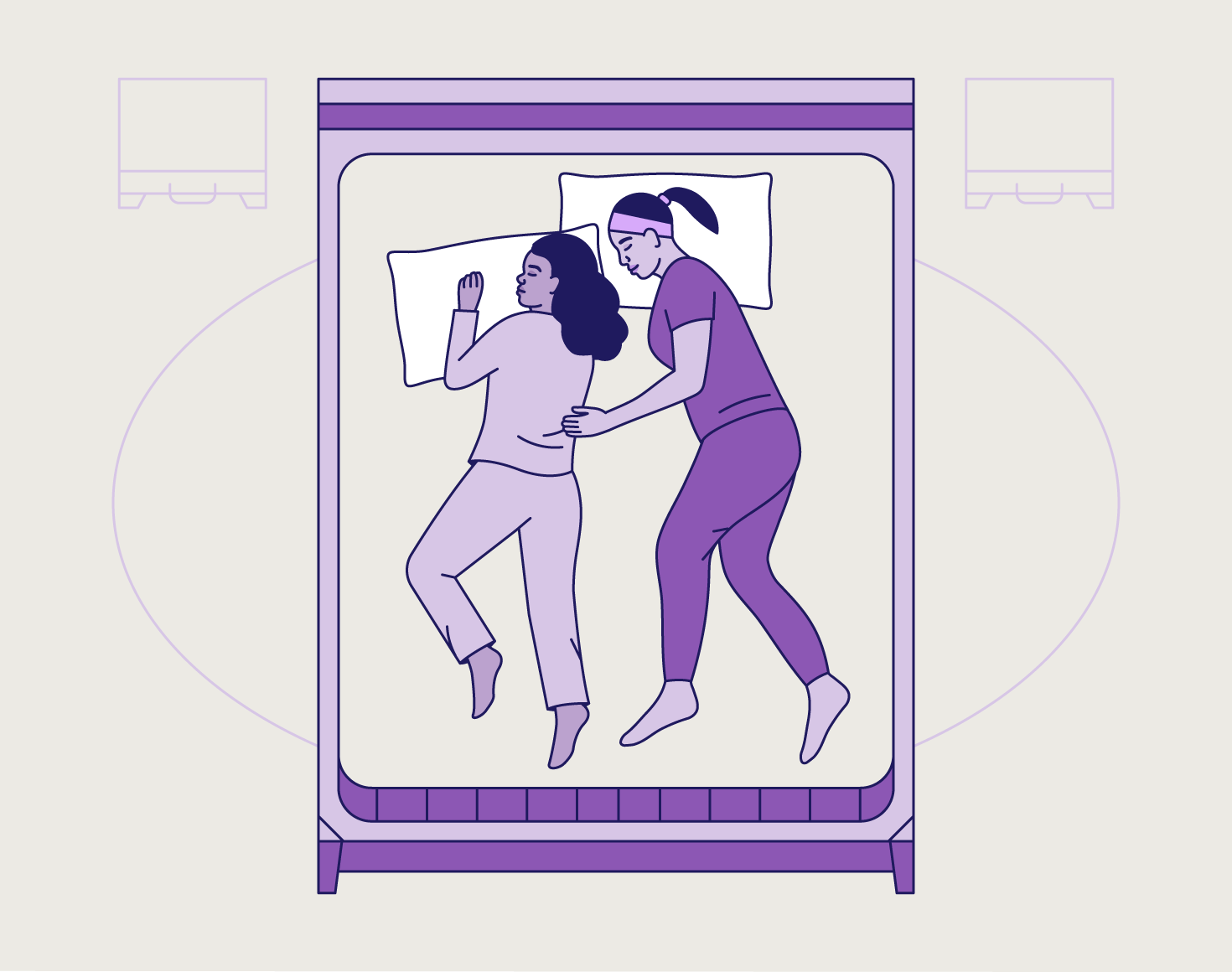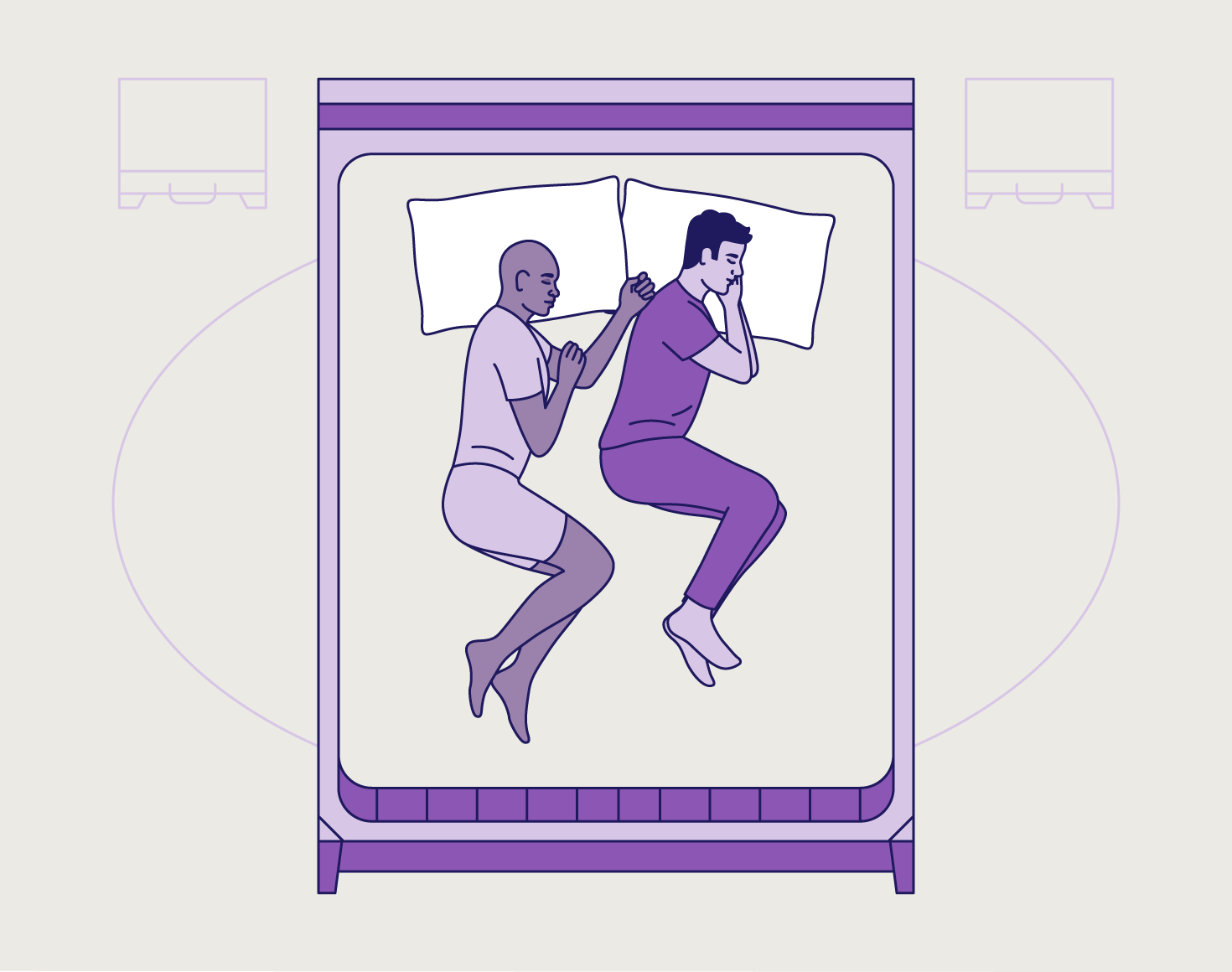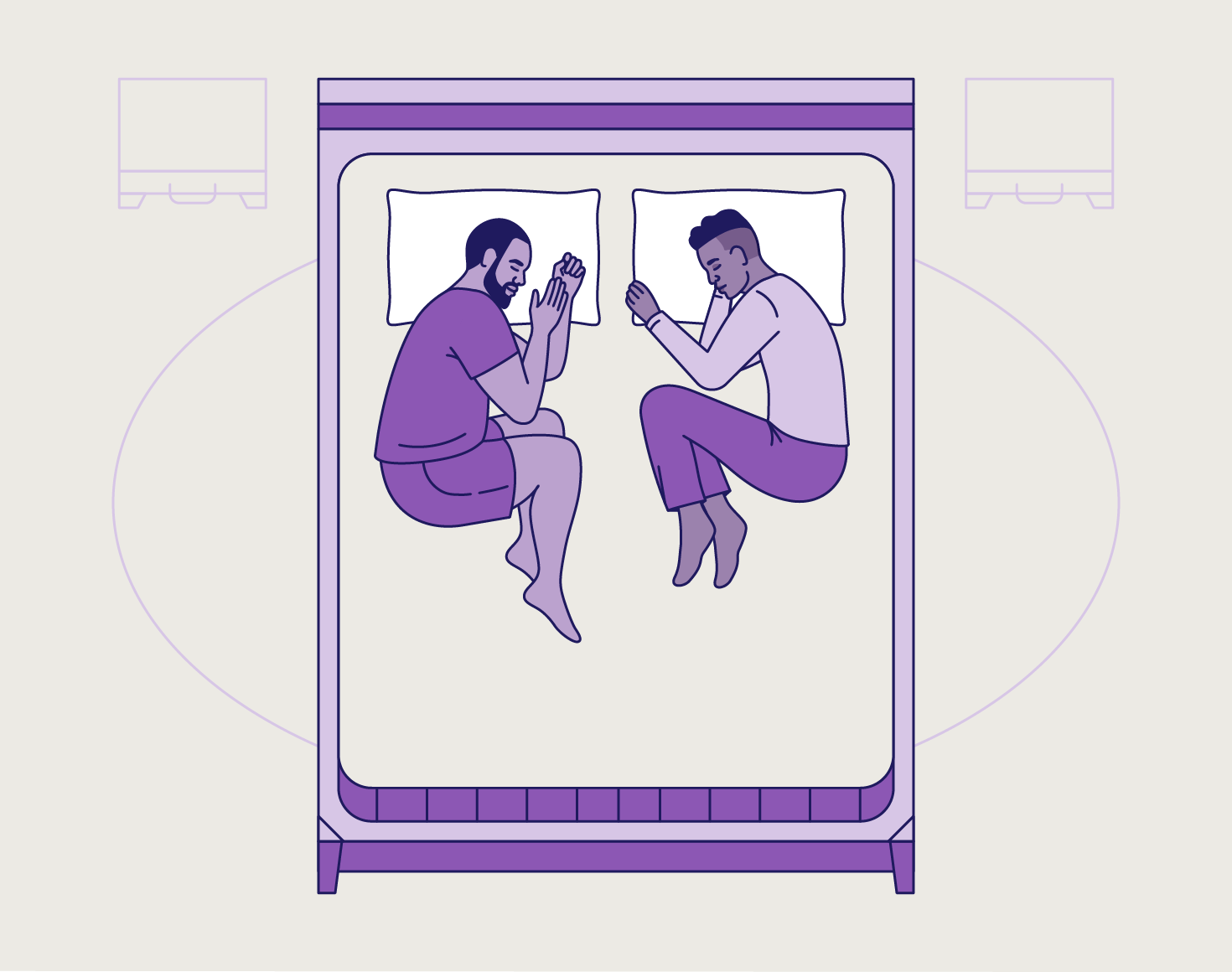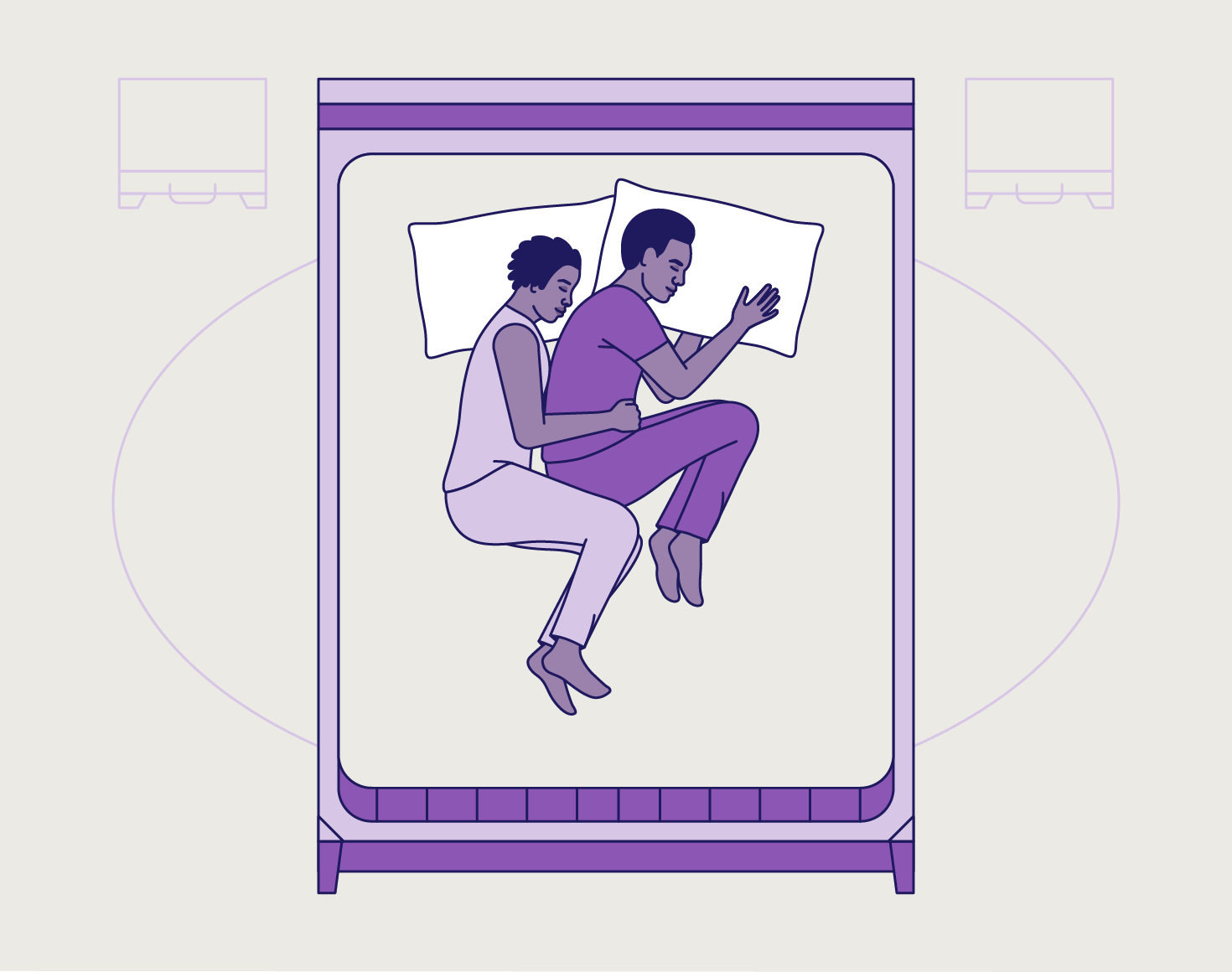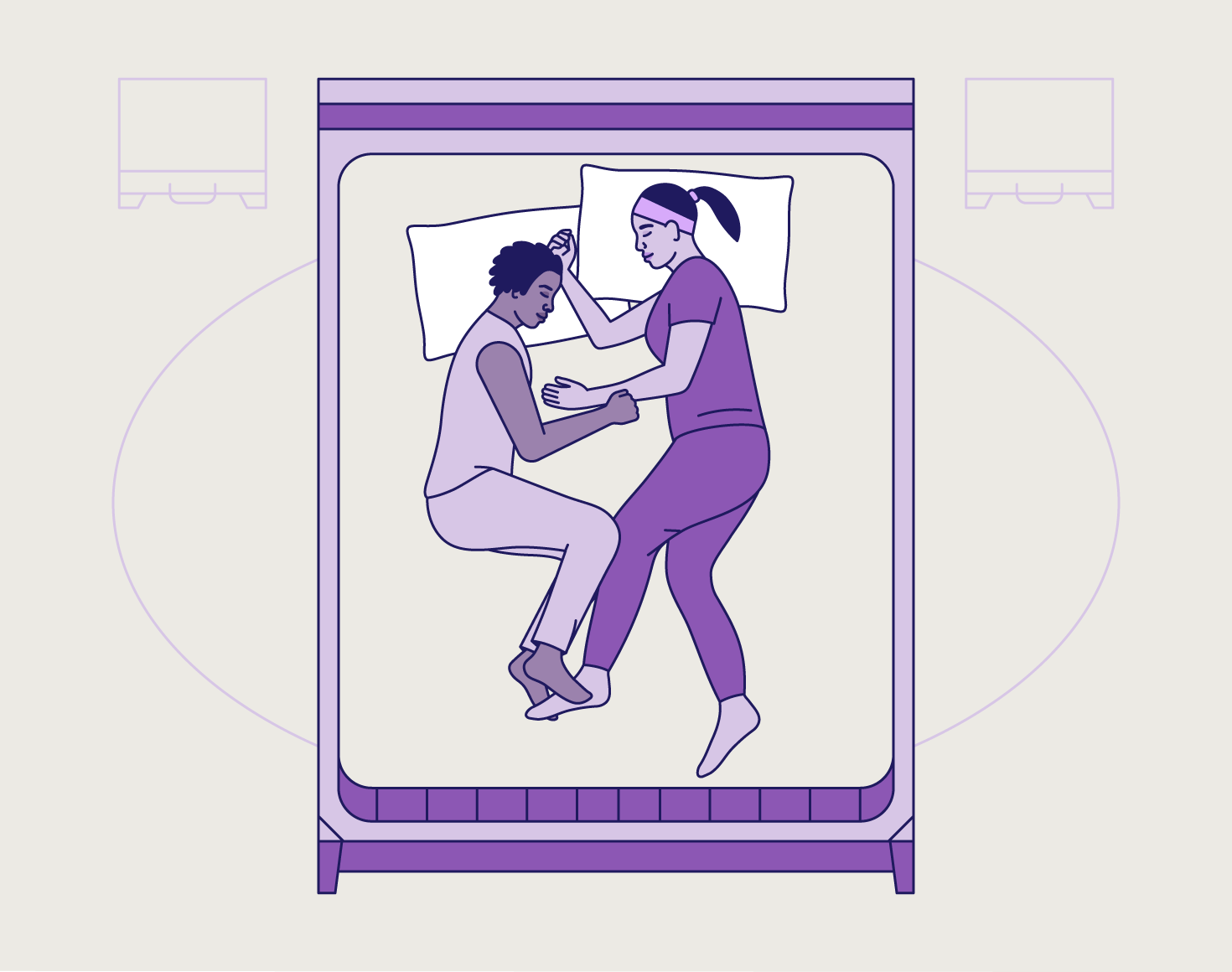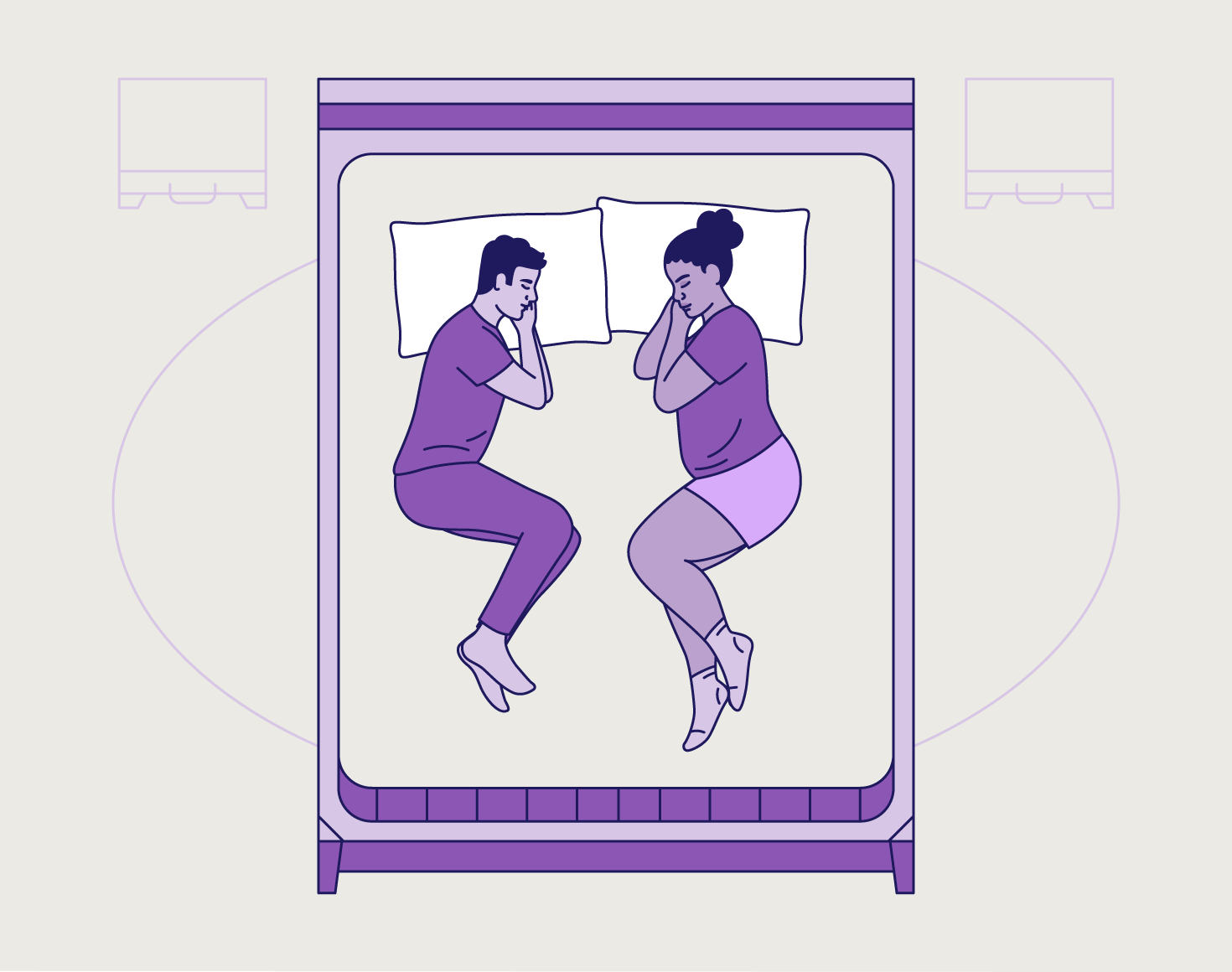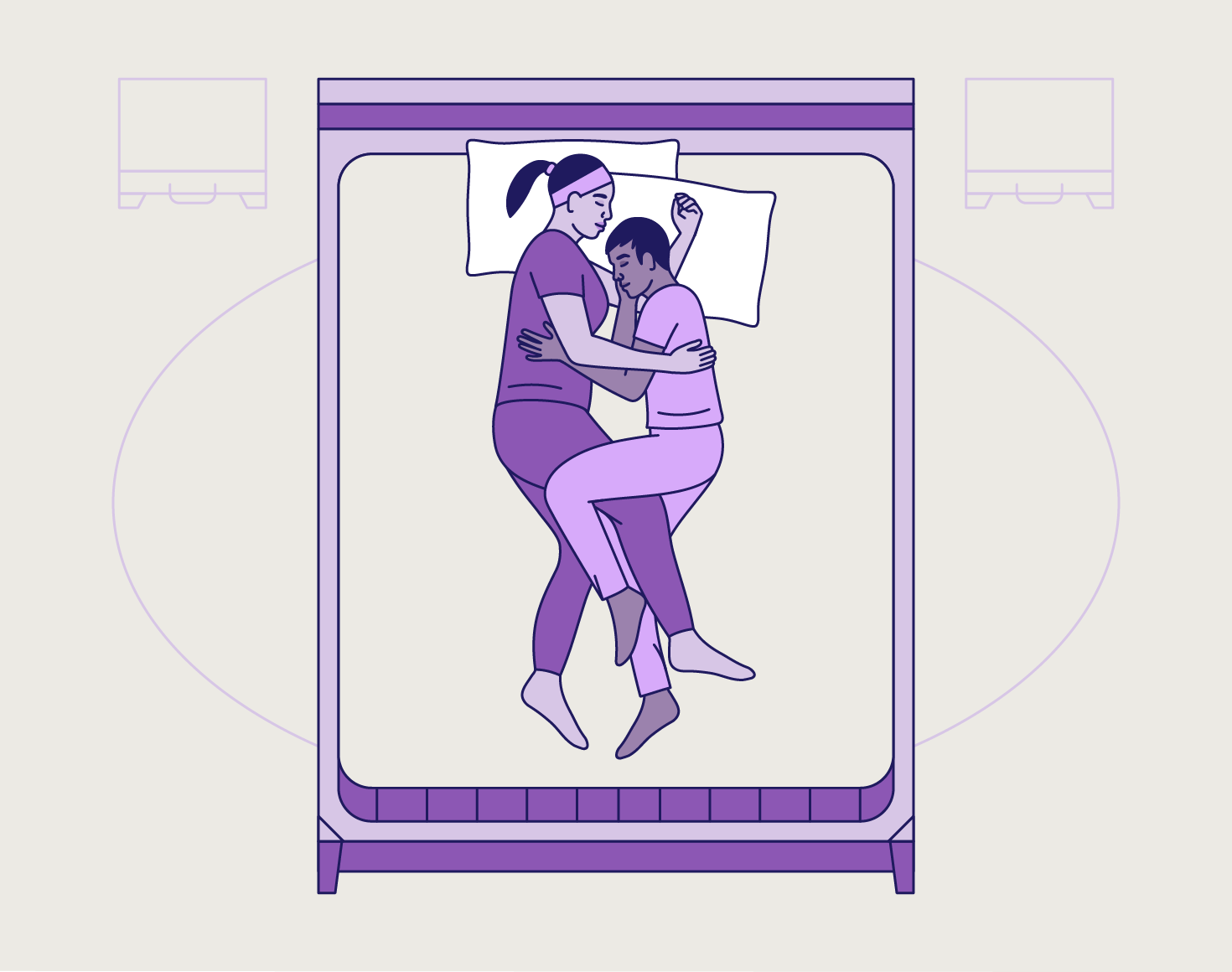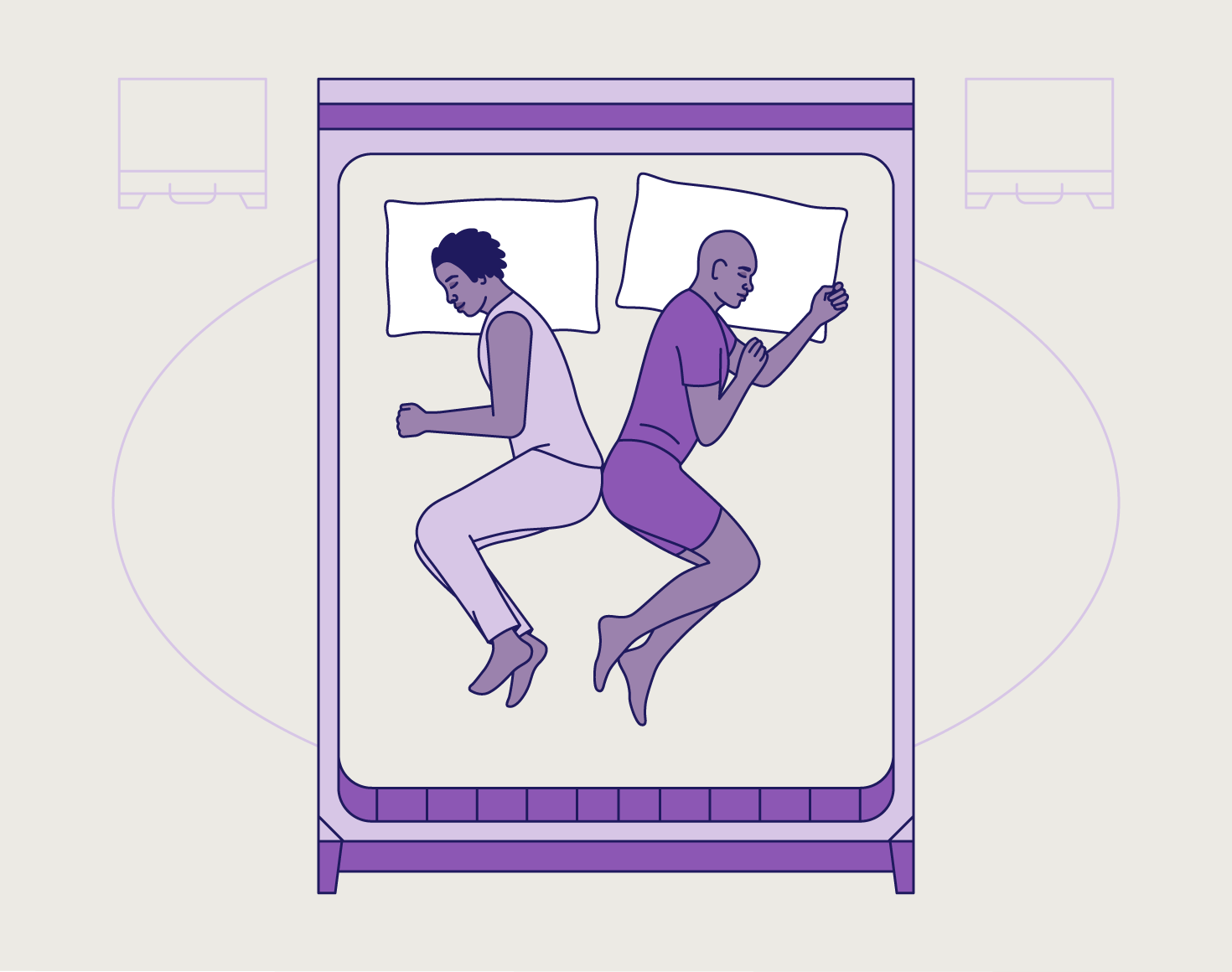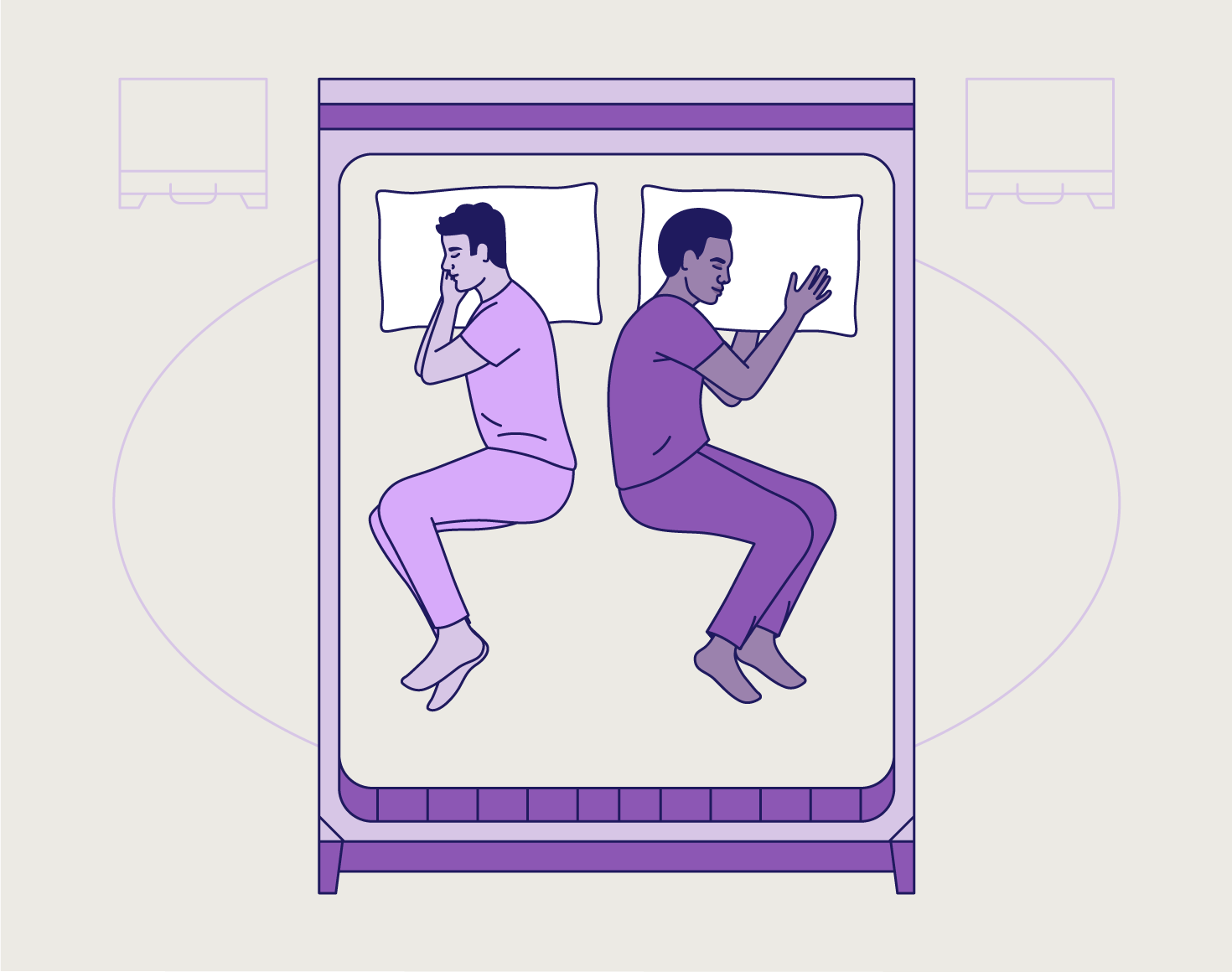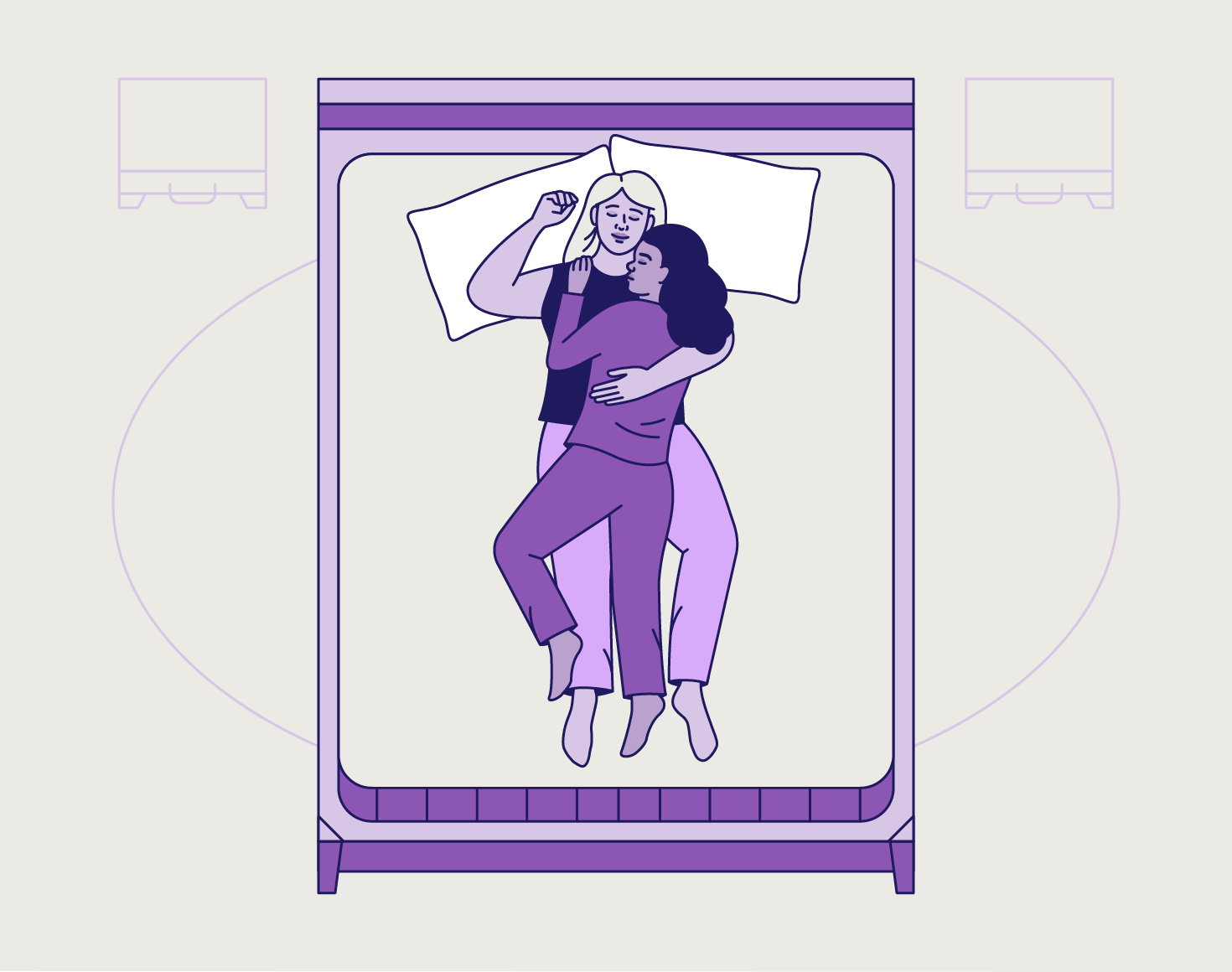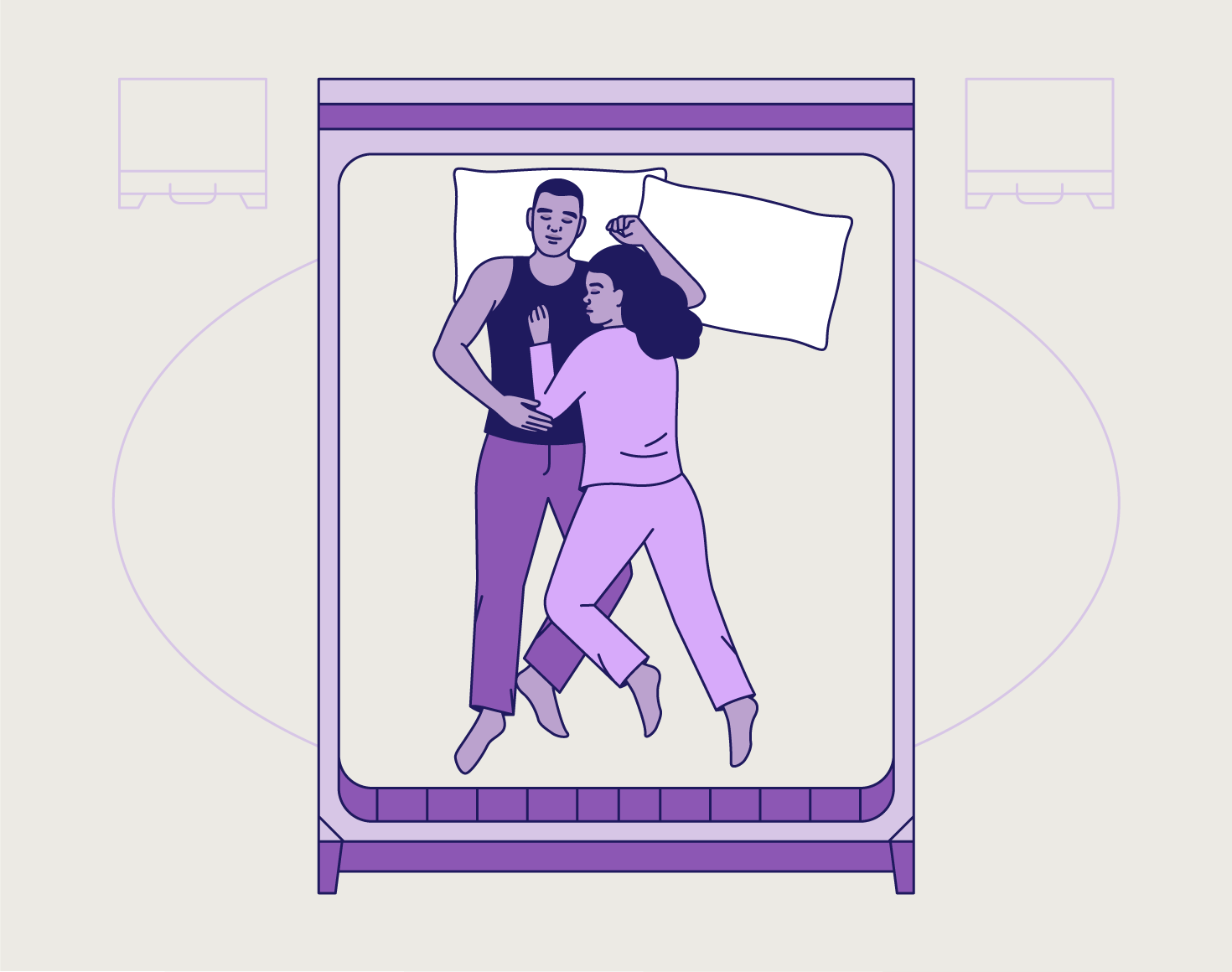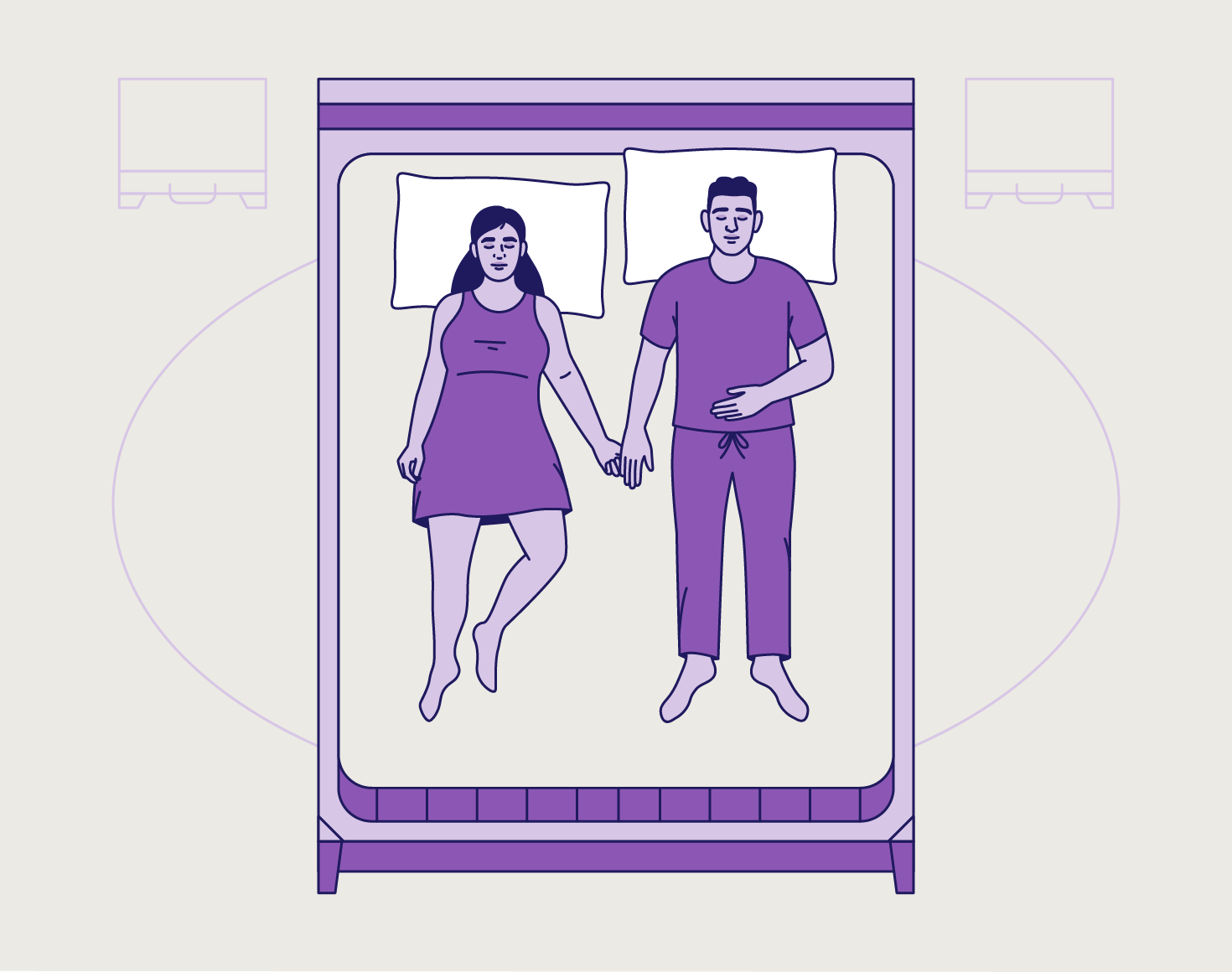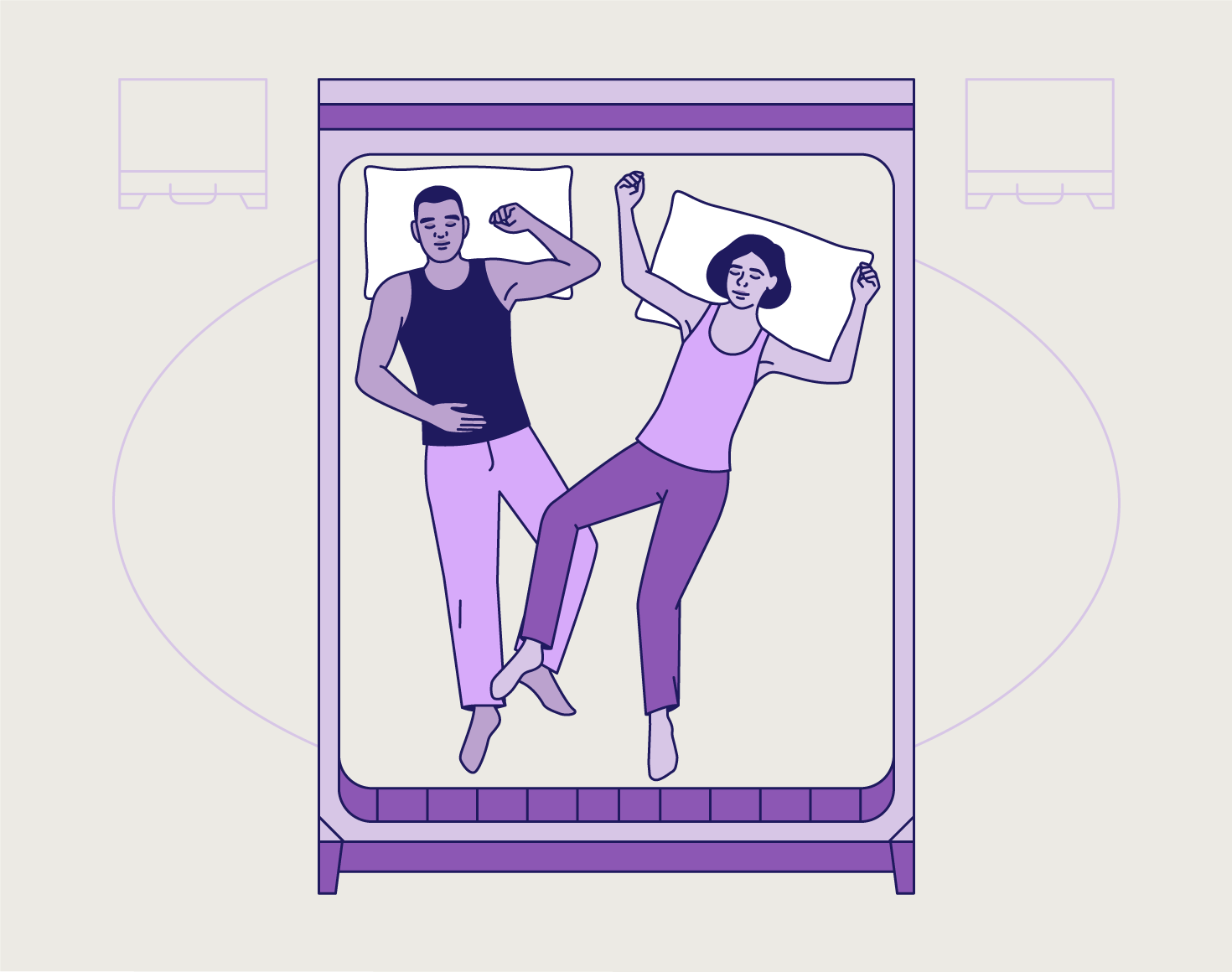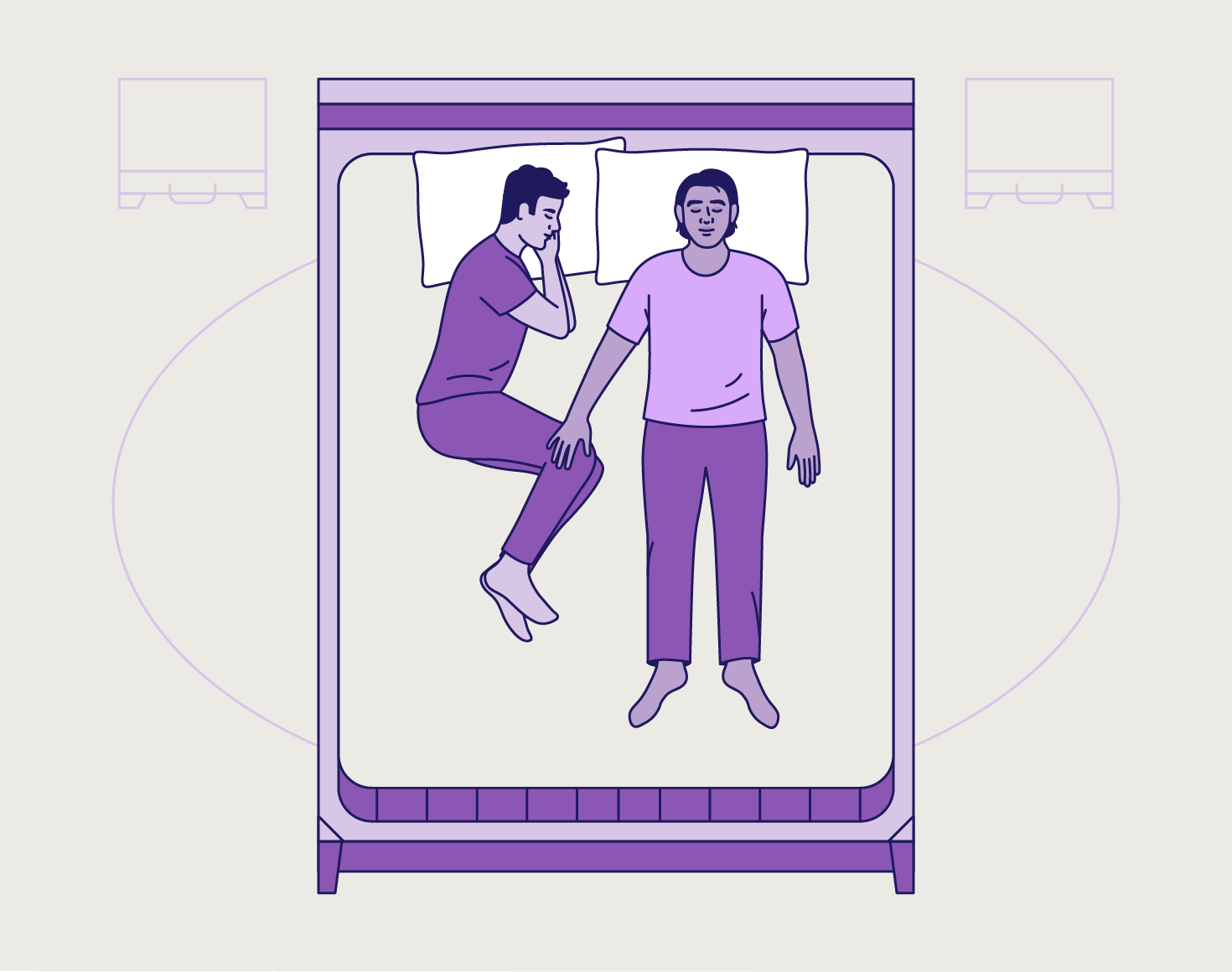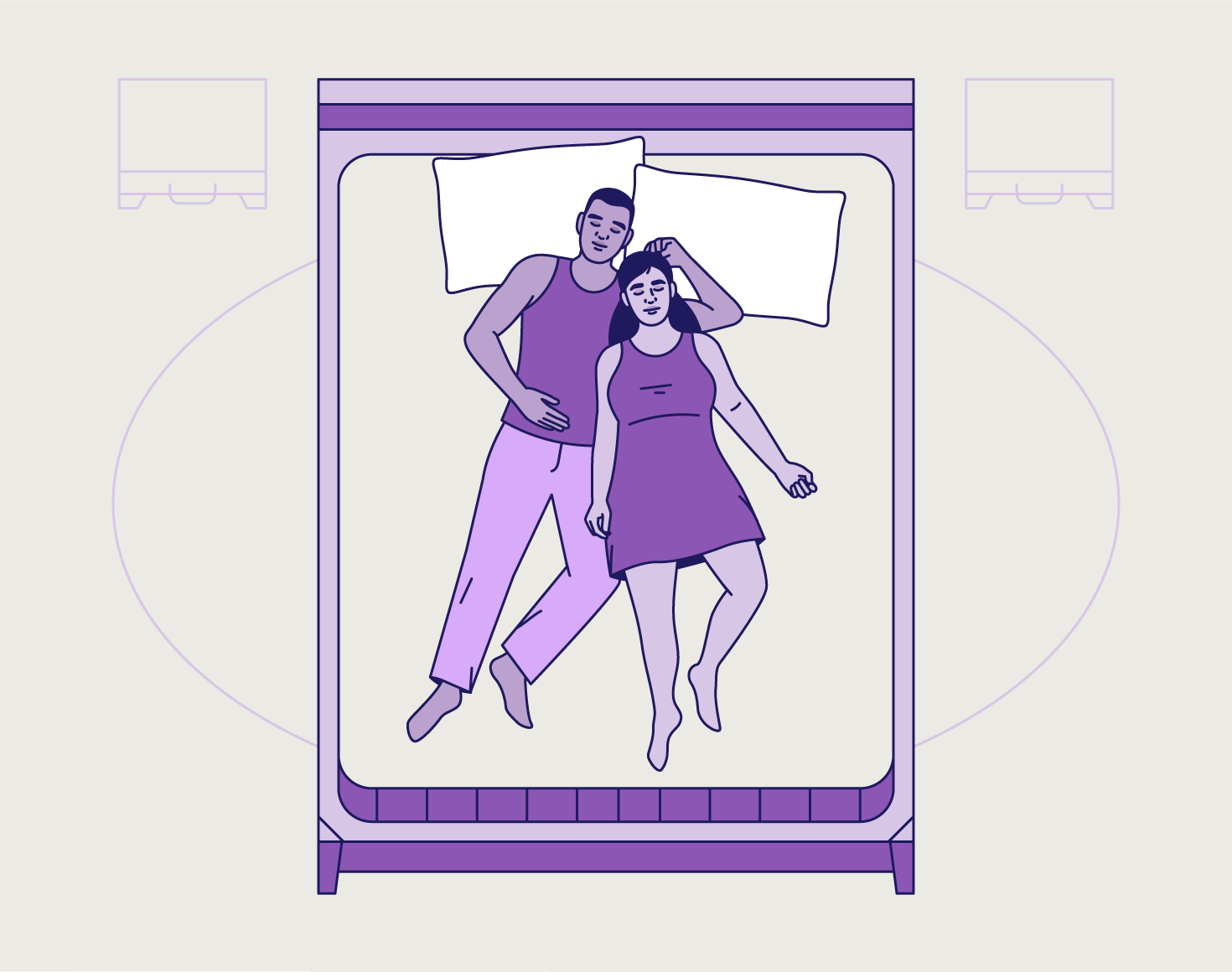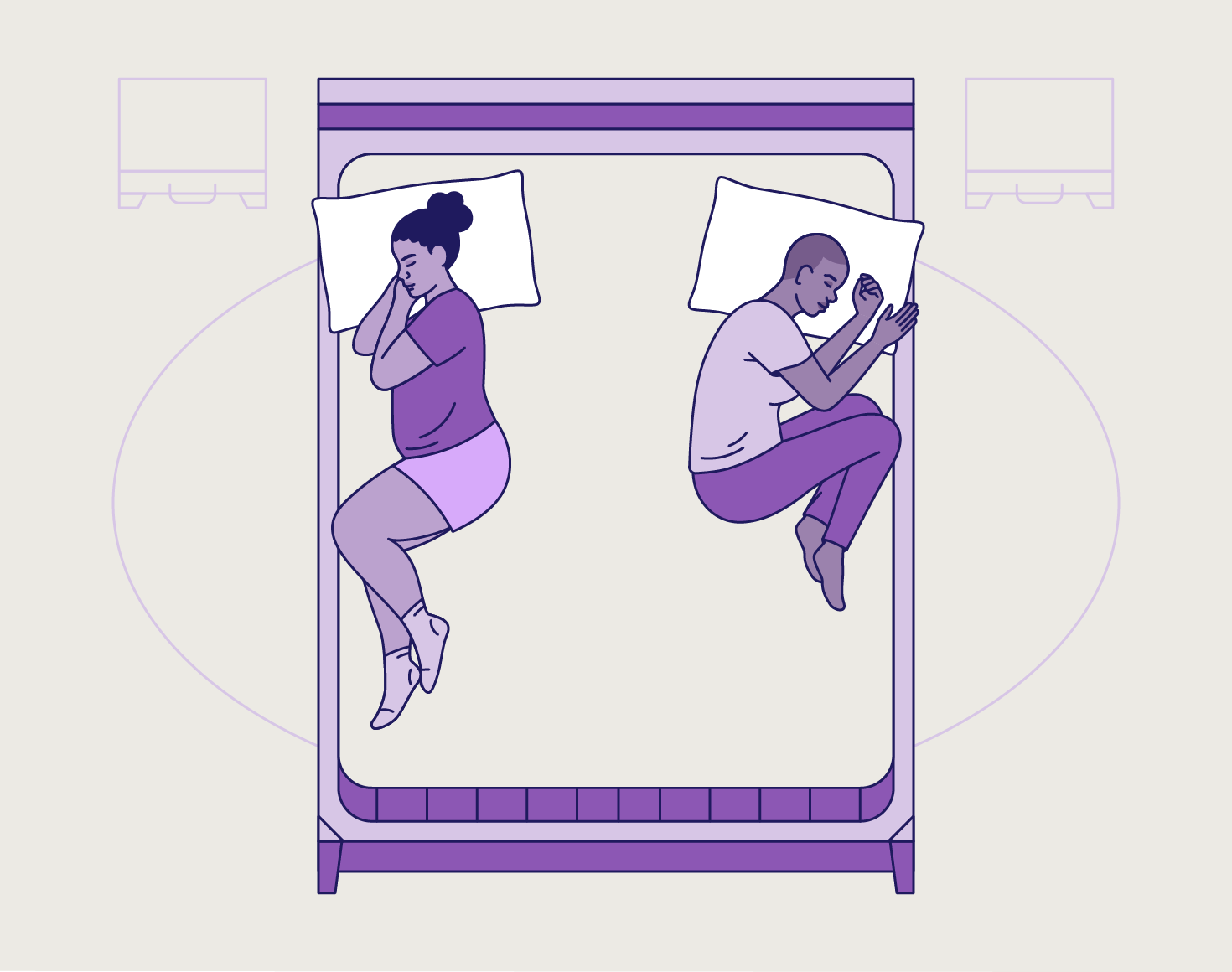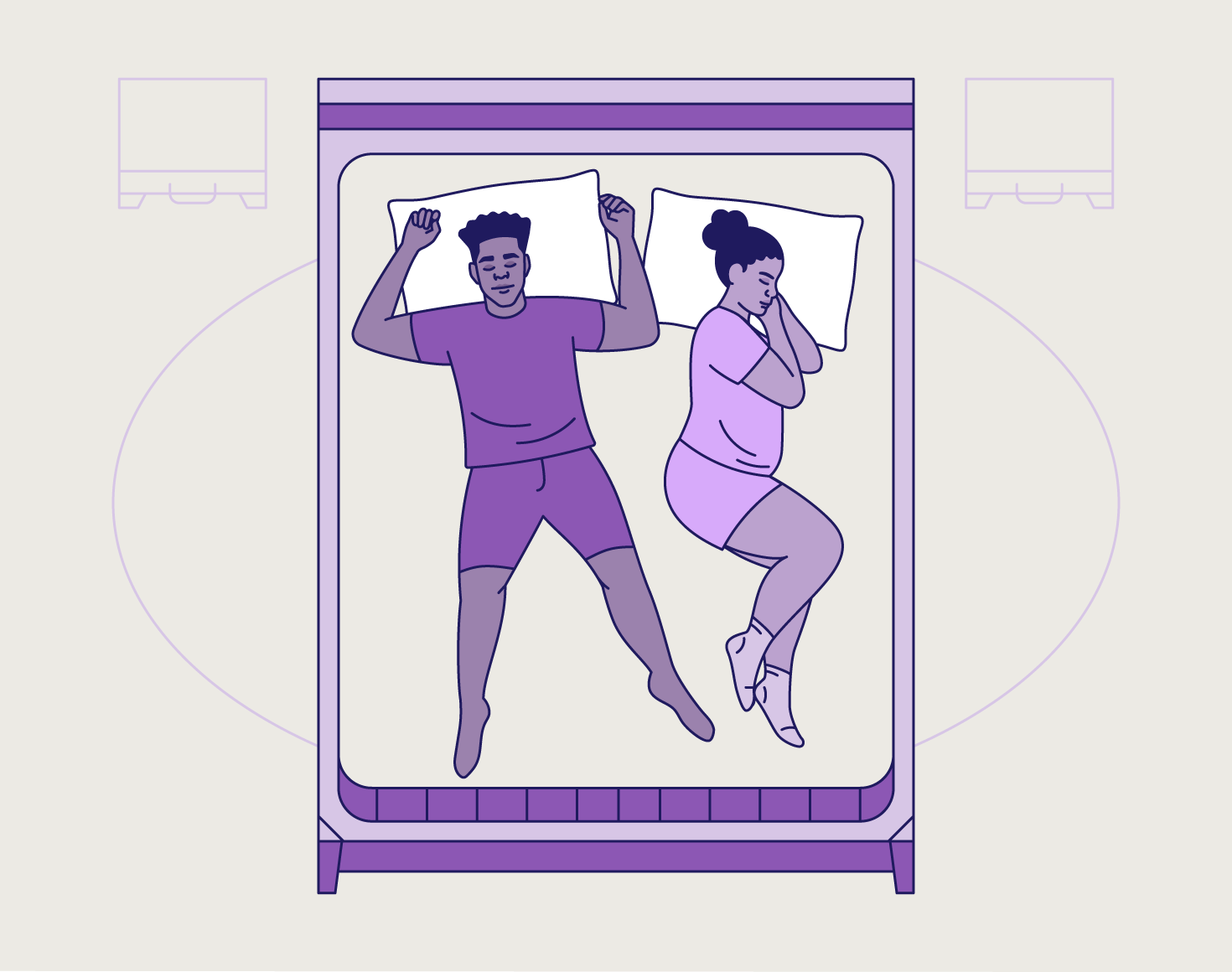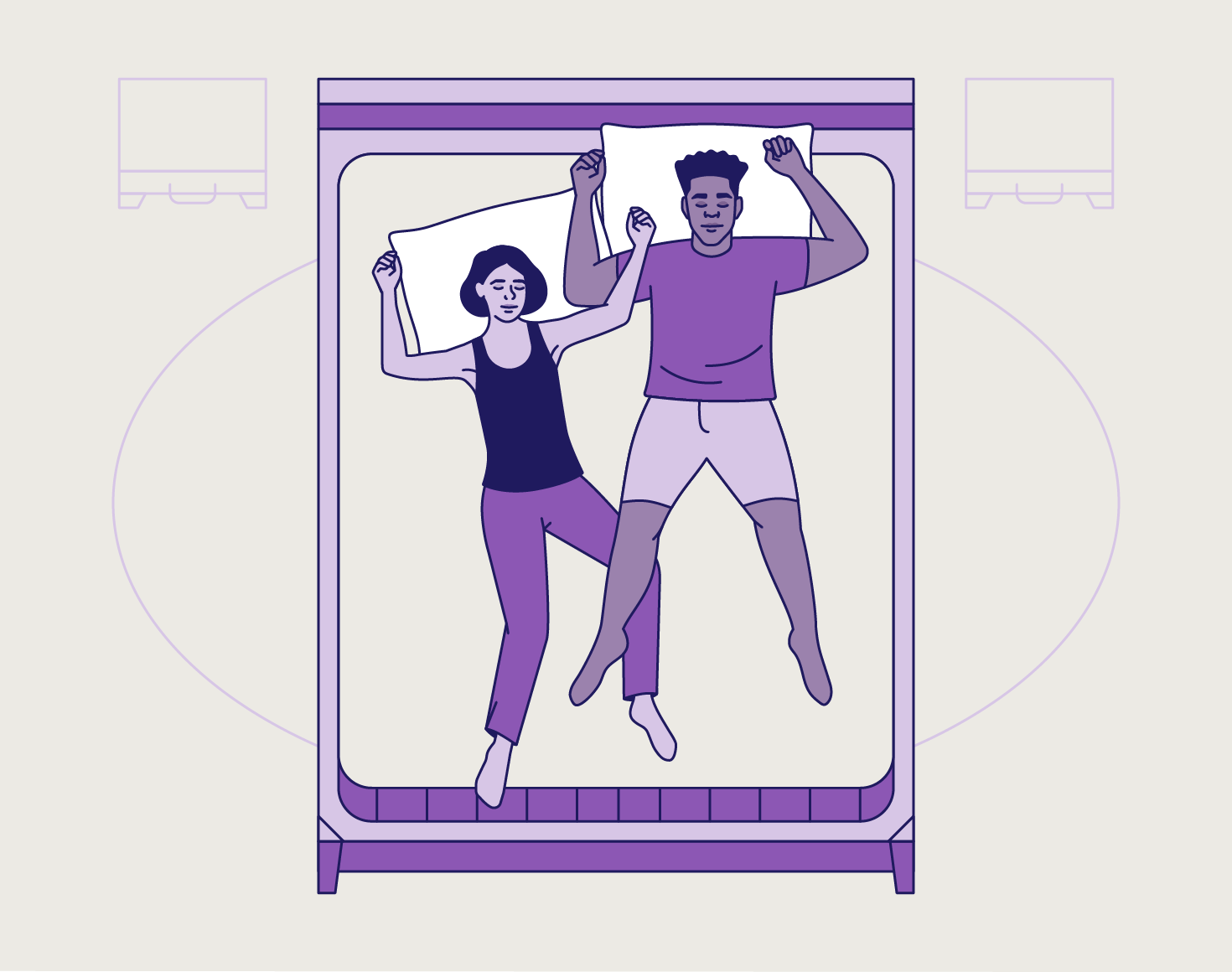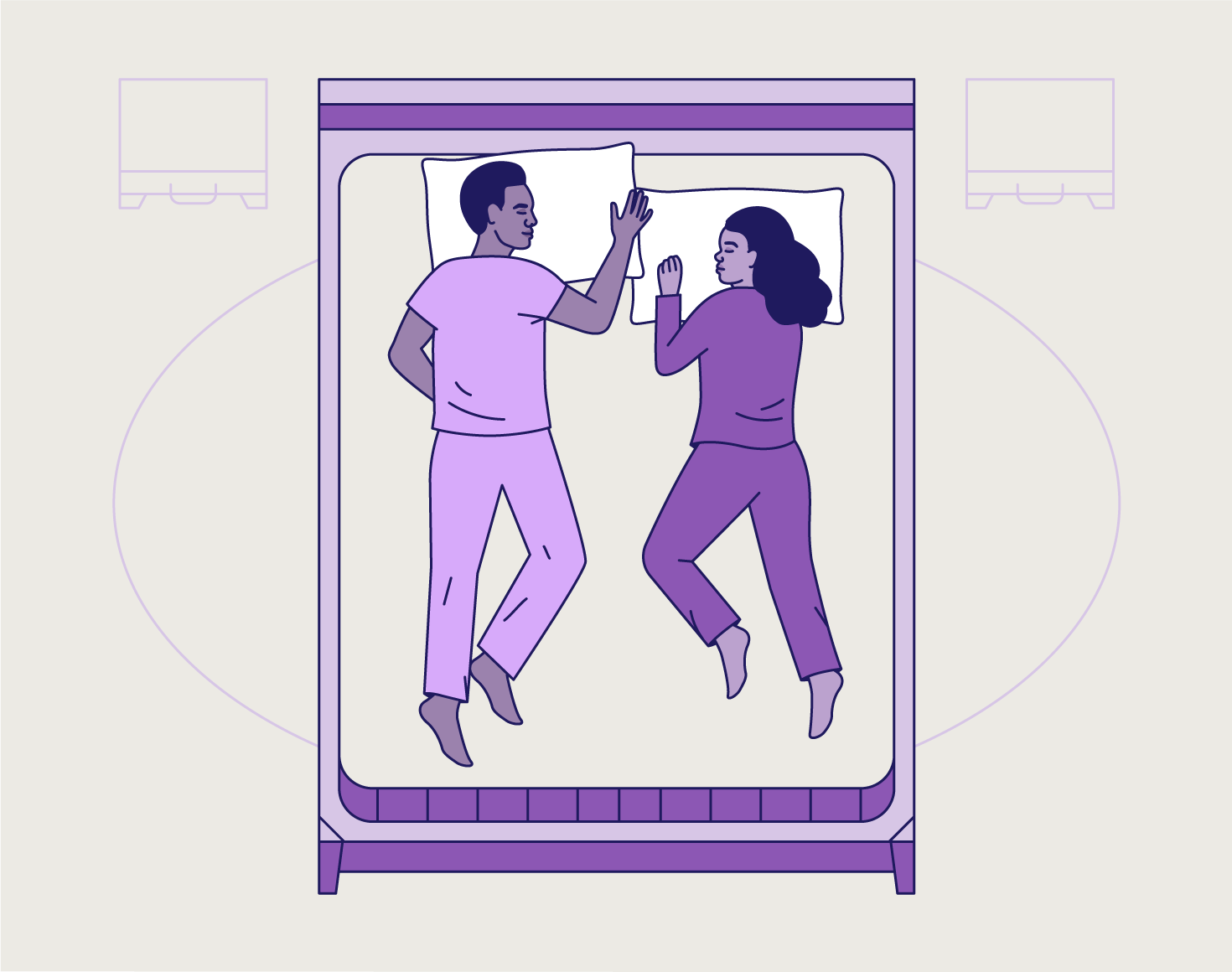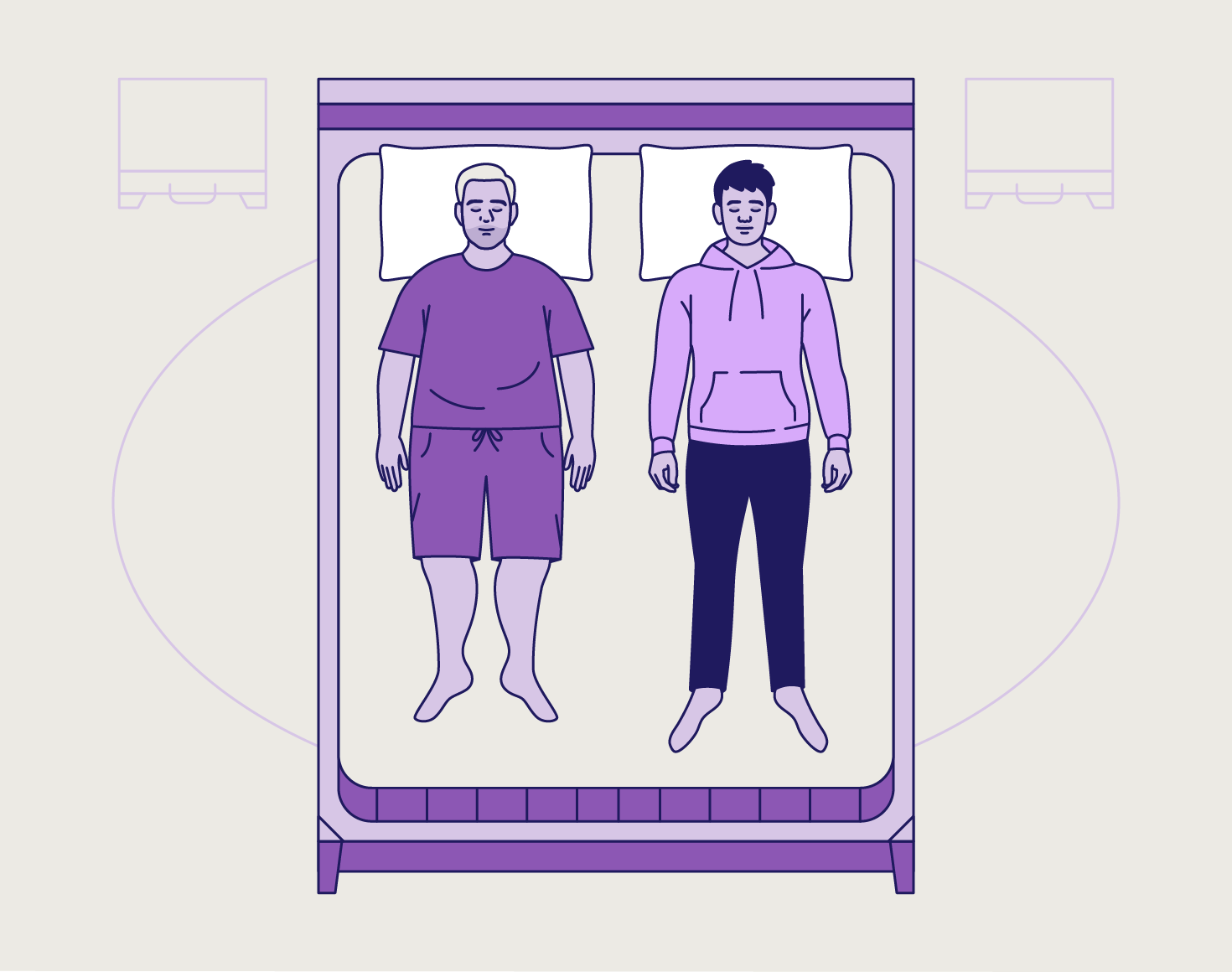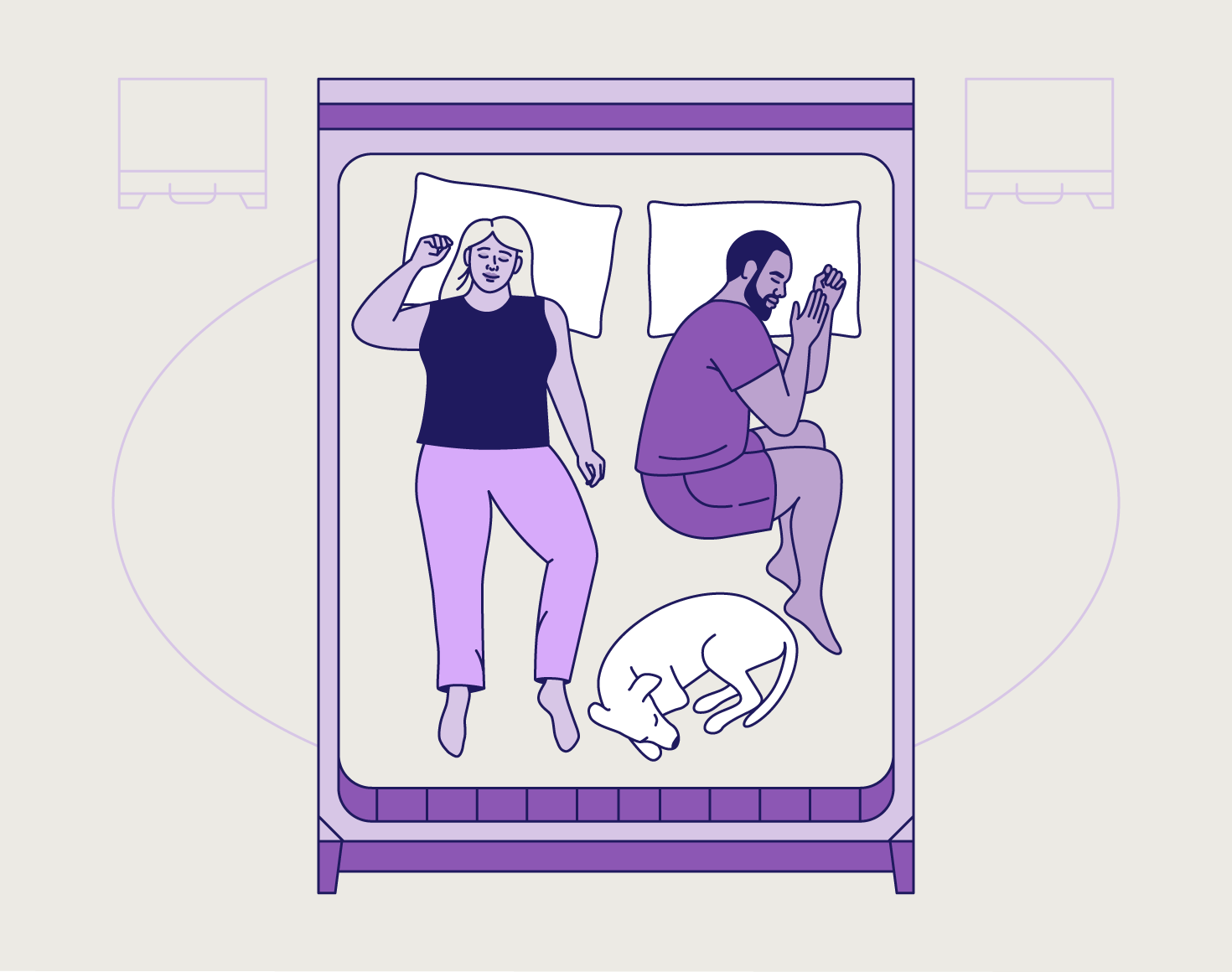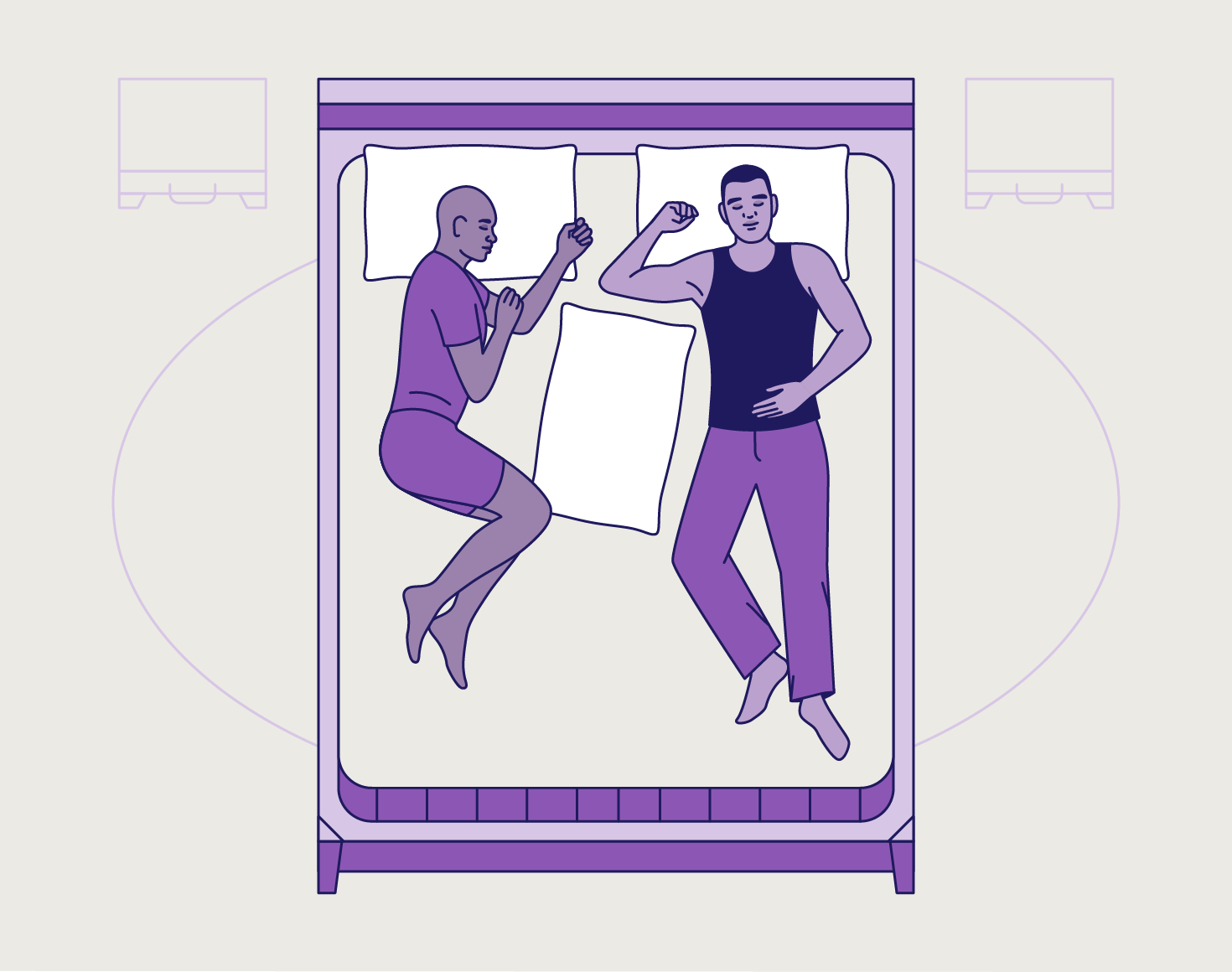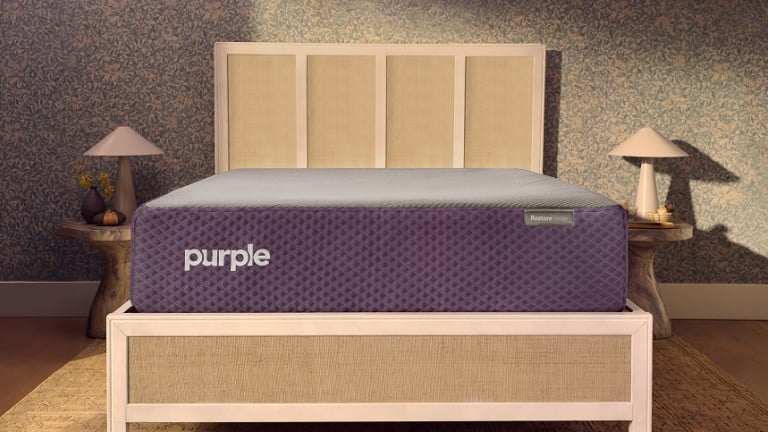
23 Popular Couples’ Sleeping Positions and What They Mean
Key Takeaways:
- Some of the most common couples’ sleeping positions include spooning, back-to-back, and face-to-face.
- The way you sleep with a partner may reflect your relationship, but as long as you’re both comfortable, your sleep positions could suggest mutual understanding.
- The best couple’s sleep position should accommodate both partners’ comfort, support, and intimacy needs.
Some people believe that you can learn a lot about a person from their preferred sleep position. If that’s the case, then what do different couples’ sleeping positions say about you and your partner?
Relationship and body language experts sometimes suggest that your sleeping position is tied to your personality, and couples’ sleeping position could reflect aspects of the current state of your relationship — whether consciously or subconsciously.
Keep reading to explore 23 couples’ sleeping positions and what they could say about your relationship, plus how they may reflect on your personality traits.
23 Most Common Relationship Sleeping Positions + Their Meanings
Whether you sleep on your back without touching or fall asleep curled against each other, different relationship sleeping positions are sometimes interpreted as providing insights into relationship dynamics, according to some relationship experts.
One survey led by University of Hertfordshire Professor Richard Wiseman asked 500 couples how they sleep to evaluate the connection between sleep positions and relationship health. It found that 94% of couples who sleep while touching their partner are happy with their relationships, compared to 68% of couples who sleep without touching.1
From strengths and fears to stressors and feelings of safety, different sleeping positions may indicate how you and your partner feel about each other — though it’s more likely that they simply reflect comfort and what positions you prefer. For example, tossing and turning may simply mean you can’t get comfortable in bed — not necessarily that your relationship is causing you stress. If you or your partner seem to constantly wake up from each other's movement, consider investing in a mattress with motion isolation.
It’s important to note that these interpretations are based on limited survey research and expert opinion, not conclusive scientific evidence.
1. The Spooning Position
Meaning: One partner hugging the other from behind
The spoon position entails having one person (the “big spoon”) hug another person (the “little spoon”) from behind in a protective stance.
This intimate position is often interpreted as reflecting closeness and comfort , especially for couples in the early stages of their relationship.
2. The Chasing Spoon
Meaning: Spooning with space between partners
Unlike in the classic spoon, there is a bit of space between partners in the chasing spoon position. Usually, the little spoon will lay on one side of the bed in a log or fetal position while the big spoon adjusts their position to "chase" them.
The little spoon may prefer more space to themselves when sleeping; they may be a hot sleeper wanting to keep cool, or they may just like having more room to sprawl. Big spoons who reach for their partner in this position likely respect their partner’s needs but still want to maintain physical contact.
As long as both partners communicate about their needs and preferences, this position can be a comfortable compromise.
3. The Loose Spoon
Meaning: Spooning with less physical contact
The loose spoon is very similar to the classic spoon but with less contact and more space between partners. It is sometimes seen as a balance between closeness and prioritizing sleep quality.
4. The Separate Fetal Position
Meaning: Both partners curled in the fetal position
Sleeping in the fetal position is relatively common. If you and your partner prefer to sleep curled up but separate, this may be interpreted as comfort and security, though it can just as easily reflect what feels physically restful.
5. Fetal Position Cuddle
Meaning: Spooning with both partners in the fetal position
This position means both partners are curled up and touching, with one person playing the “big spoon” role to wrap around the other. This intimate position is often interpreted as suggesting a strong physical connection.
6. Face-to-Face
Meaning: Facing each other on your sides while touching
Sleeping face-to-face with light physical contact — touching hands, feet, or even elbows — may be seen as a sign of like-mindedness and comfort between partners. You may incline your foreheads towards each other or drape your arms over each other in a loose embrace.
This position may be preferred for side sleepers comfortable lying on their left and right sides. Some couples may consider switching which side of the bed they sleep on to make this position work.
7. The Face-to-Face Without Touching
Meaning: Side sleepers who face inwards with no contact
In this sleeping position, couples face the center of the bed without touching each other. The amount of space between you can vary depending on what size mattress you get and how close you like to be to your partner.
Sleeping in this position could suggest that both partners recognize the need for personal space.
8. Face-to-Face Hug
Meaning: Cuddling for side sleepers
If you sleep intertwined or cuddling facing each other — also known as "the lover's knot" — you and your partner may find comfort in constant touch. New couples may gravitate towards positions like this and the classic spoon to foster intimacy and connection overnight, but it’s a relatively uncommon way to sleep throughout the night.
9. The Butt-to-Butt
Meaning: Side sleeping while facing away but touching
Sleeping butt-to-butt is often described as a sign of ease and trust, though it may also just be the most comfortable arrangement for side sleepers.
10. Back-To-Back Without Touching
Meaning: No contact between side sleepers facing away from each other
Also called the “liberty lovers” position, couples who sleep in this position face opposite directions without touching at all.
If there is little space between the couple, it could mean that they're comfortable and secure enough to sleep apart. It is possible that the two people involved just don’t enjoy the warmth of cuddling up under blankets together.
Every couple is different, and if you both agree that the position is comfortable, then the amount of space between you may simply mean you respect each other’s preference for space.
11. The Weighted Blanket
Meaning: One partner lies on top of the other
Lying under a weighted blanket can help you feel calm, safe, and snug, but using your partner as a top layer instead challenges the idea of how heavy weighted blankets should be. For cozy couples, this position fosters closeness, though it may be uncomfortable for the person lying directly on the bed.
Experts generally recommend an actual weighted blanket instead for safety and comfort.
12. The Cradle
Meaning: One partner rests their head on the other
Also called "the nuzzle," this position involves one partner laying their head on the other's chest, usually with their legs entangled.
This position is commonly interpreted as a display of protection, security, and affection.
13. The Hand Hold
Meaning: Back sleepers who hold hands
Lying on your backs while holding or gently touching each other’s hands is also known as the “paper doll” position. Couples who sleep like this may balance having a strong connection with setting productive boundaries, though it could also simply reflect a natural way of maintaining gentle contact.
14. The Leg Hug
Meaning: Individual positions with legs intertwined
Of the different couples’ sleeping positions, the leg hug is one of the most flexible. Couples fall into their own individual positions but keep their legs entwined to some level.
If you're tightly intertwined, this may reflect a strong emotional and physical connection, and a loose leg hug may suggest a desire for closeness with a mutual respect for individual space.
15. The Loose Knot
Meaning: Physical contact between different sleep styles
The loose knot has an appropriately loose definition, describing couples who sleep in different positions while maintaining some physical contact. Like the hand-holding position, partners who prefer a loose knot may value independence and personal comfort.
A variation of this position is the unraveling knot, in which you start the night close to your partner, often intertwined, then gradually separate to get more comfortable. An unraveling knot may suggest that, even if you’re a restless sleeper, you both value physical intimacy and want to feel close to one another as you fall asleep.
If both partners frequently move around in their sleep, your mattress may slide around, especially if it’s not the correct size for your bed frame. Changing your sleep style may help keep you both comfortable with minimal disruptions if this is the case.
16. The Head-On-Shoulder
Meaning: Overlapping back sleepers using one as a pillow
Also known as the “shingles” sleeping position, this position has both partners sleeping on their backs, with one partner resting their head on the other’s shoulder.
It may show camaraderie with a sense of understanding. For some couples, this position may indicate a feeling of security, where one partner feels safe and protected by the other.
17. The Cliffhanger
Meaning: Side sleepers who cling to the edges of the bed
Couples who sleep on the opposite edges of the bed fall into the cliffhanger position, defined by the amount of space between partners. Content couples with healthy boundaries who value having plenty of space to sleep may adopt the cliffhanger position to support deeper sleep.
18. The Bed Hog
Meaning: One partner takes up too much space
In this position, one partner lies on their back with their limbs splayed, taking up most of the mattress space, a position known as the “starfish.” Due to the lack of space, their partner takes a secondary role, often sleeping in the fetal position or with one leg dangling over the edge of the bed.
If you find yourself sprawling out and leaving little room for your partner, consider looking into bigger bed sizes to help improve your and your partner’s sleep environment.
19. The Starfish Cuddle
Meaning: Both partners sprawl while touching
Unlike the bed hog, the starfish cuddle position allows both sleepers to sprawl out while touching or overlapping limbs in some way. Because the starfish position requires ample space to stretch, the starfish cuddle is likely only comfortable on a large bed like the Alberta king bed so both partners can be comfortable.
20. The Double Stomach Sleeper
Meaning: Both partners sleep on their stomachs
As the name suggests, this position is when you and your partner fall asleep on your stomachs. Sleeping on your stomach is less recommended because it can increase strain on the spine and neck.
21. Double Soldier
Meaning: Both partners sleep on their backs without touching
Sometimes dubbed the “toy soldiers” position, the double soldier is a straightforward arrangement where both partners lie on their backs, hands at their sides, without touching.
Sleeping in this position eliminates the possibility of cuddling, but it’s likely that both you and your partner simply prefer independently lying on your backs. If you want more contact, you can try holding hands in this position or cuddling at other times of the day.
22. The Great Wall Of Pet(s)
Meaning: Sleeping with a pet between partners
Many people treat their pets like family, which means sharing their beds with them — even if it means sacrificing comfort. Putting your pet in the middle of the bed likely reflects just how much you love your pets and want to keep them close.
23. The Pillow In Between
Meaning: Sleeping with a pillow between partners
For combination sleepers or anyone prone to flailing in their sleep, this pillow wall can preserve personal space and prevent unintentional contact or sleep disruptions. Hugging pillows for side sleepers can also be more comfortable, helping support the natural curves of the spine.
This sleep position might suggest a preference for independence and a mutual understanding of what you need to sleep well.
Is There a Link Between Sleep Positions And Personality Traits?
Your sleep position primarily represents what feels comfortable, not who you are. It’s not a proven scientific fact that you can conclusively infer something about someone’s personality based on how they sleep, but some psychologists believe there may be a link.2
British professor Chris Idzikowski, Director of the Sleep Assessment and Advisory Service and the Edinburgh Sleep Centre, surveyed over 1,000 adults to determine whether this was true. His key findings about different sleep positions included:
- The fetal position could indicate shyness and sensitivity.
- The log position might suggest a sociable person who trusts strangers.
- The soldier position may reflect that a person is quiet, reserved, and likes to be in control.
But Idzikowski’s research is not without limitations. The findings weren’t replicated with a second group of participants, and since survey participants reported on their own personality traits and sleep position, the risk of self-report bias was high.
In most cases, how you prefer to sleep simply represents the position that allows you to fall asleep and stay asleep.
Get a Good Night’s Sleep With Purple Regardless of Your Sleep Position
No matter which of these couples’ sleeping positions you and your partner prefer, it’s important to foster connection and communication with your partner to ensure everyone’s needs are met. Be sure to choose the best mattress size for your relationship to keep you both comfortable regardless of your preferred sleep positions.
Everyone deserves a good night's sleep, whether that means sleeping intertwined with your partner or in separate beds. Purple offers a variety of mattresses that are designed to support the comfort of all kinds of couples, so you can enjoy each other’s company, and rest with fewer disruptions.
FAQ
Sleeping on your back or your side is generally considered healthier than sleeping on your stomach. So, any position that lets you do that with your partner should be okay. Of the sleep positions we highlighted, that includes:
- Spooning
- Face-to-face
- Butt-to-butt or back-to-back
- Cradle
- Hand hold
- Leg hug
- Loose knot
- Head-on-shoulder
- Cliffhanger
- Starfish cuddle
- Double soldier
- Great wall of pet(s)
- Pillow in between
Some of the most popular sleep positions for couples include spooning and sleeping back-to-back. What’s popular isn’t necessarily what’s best for your relationship; your ideal sleep arrangement depends on what feels most comfortable to you and your partner.
Sharing a bed with your partner may help some couples feel physically and emotionally closer by fostering intimacy, encouraging communication, and helping to synchronize your sleep schedules.
Some studies suggest that couples who share a bed report better sleep quality.3 Co-sleeping couples have also been found to experience less-fragmented REM sleep with fewer disruptions, which may positively impact sleep and mental health.4
More To Explore
Level up your sleep routine with our most-loved products.


